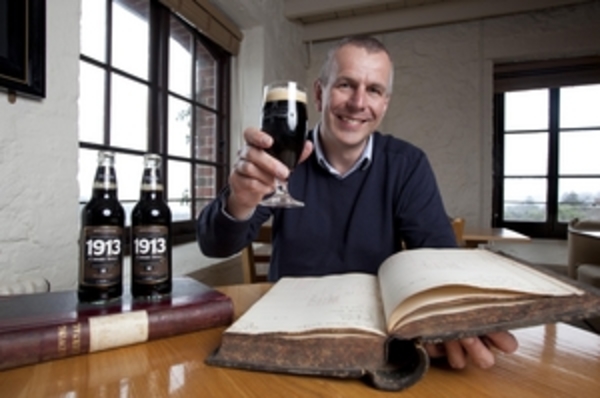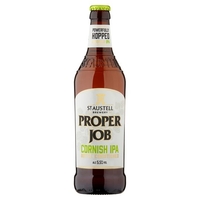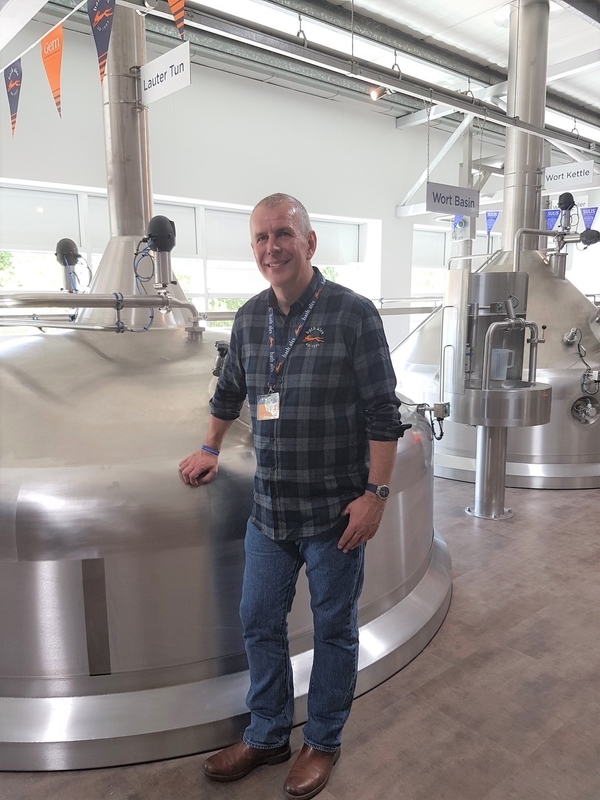Roger Ryman, a proper job brewer
Added: Monday, June 1st 2020

Roger Ryman was a brewer touched by genius. He boosted the fortunes of St Austell Brewery in Cornwall by turning Tribute and Proper Job into beers that found acclaim with drinkers far beyond the West Country.
Roger, who has died aged just 52 after a heroic struggle with cancer, spent more than 20 years at the Cornish brewery where his predecessor once said beer sales “fell off the cliff” at the end of the summer when visitors left – an exit that effectively halved the county’s population.
To survive in the keenly competitive brewing industry, Roger joined forces with James Staughton in 1999 to take the brewery’s beers to a wider audience. James was the new managing director at St Austell and, as the great-great grandson of William Hicks the founder of the company, he had a mission to stop the brewery from quietly declining and even closing.
The turn-around started in spectacular fashion in 1999. Roger had previously worked as head brewer at Maclays in Alloa where the produced monthly special beers.
“You brewed a new beer, saw how it went and then moved on,” he recalled.
At St Austell he used that experience to produce a pale ale called Daylight Robbery for the total eclipse of the sun in August 1999. He expected there would be brief interest in the beer but, he said, “it went ballistic”.
The beer became St Austell’s best seller and in 2001 it was renamed Tribute (4.2 per cent) to honour Cornwall’s famous mining communities. It soon accounted for 70 per cent of the brewery’s production – and that production soared.
Before Roger arrived, St Austell had brewed three times a week. The demand for Tribute saw three brews a day going through the plant and by 2010 St Austell was producing 60,000 barrels a year.
Roger Ryman was born in Leeds. He studied agricultural science at Newcastle University and went to work as a laboratory technician at Newcastle Breweries. He then took time out to travel round Canada and he returned home with a wife, Toni. They settled in Edinburgh where Roger studied for a master’s degree at Heriot-Watt’s acclaimed school of brewing and distilling.
He joined Maclays as head brewer in 1996 and then made the long journey to Cornwall to take up the same post at St Austell.
James Staughton, now the president of the brewery, says: “I recruited Roger in April 1999 and he immediately wowed us all with his passion for beer and brewing within minutes of his interview starting. The job of head brewer was already effectively his, right there and then – we need not have seen anyone else. He was the breath of fresh air our brewery so desperately needed at the time.”

Roger soon had a second best-selling beer to his name when he introduced Proper Job IPA in 2006. It was launched at the Celtic Beer Festival in the brewery cellars, an annual event that he and James Staughton had developed as a show case for Cornish breweries – not just St Austell – with the proceeds going to local charities.
Proper Job is a Cornish expression for a task well done. It was used in the 19th century to mark the efforts of the 32nd Cornwall Regiment that had protected the British residency in Lucknow during the Indian Mutiny of 1857.
The beer (4.5 per cent on draught, 5.5 per cent in bottle-conditioned format) was the result of a visit Roger made to the Bridgeport Brewery in Oregon in the United States where its own IPA had won several awards.
Roger was inspired to develop Proper Job, using American Cascade, Chinook and Willamette hop varieties along with German Brewer’s Gold.
He was a passionate devotee of England’s finest malting barley, Maris Otter, but to avoid trucking supplies all the way from East Anglia he persuaded local farmer to grow the grain exclusively for St Austell. Cornish Gold, as the variety was named, gives an important signature to the brewery’s beers.
The success of Proper Job spawned a beefed-up version called Big Job (7.2 per cent) with Centennial and Citra hops. Roger also developed a second collaborative beer with the New Riga Brewery in Moscow. Black Square was Roger’s interpretation of a Russian Imperial Stout, the style of strong porter and stout exported in the 18th and 19th centuries to Russia and the Baltic States.
The beer is brewed with pale, carafa and roasted grain, with Centennial, Challenger, Styrian and Target hops. The beer is aged for a year in Bourbon barrels and then steel tanks before being released once a year.
I encountered the beer for the first time at the Celtic festival in 2018. There were dozens of fine beers available but once I had tasted Black Square I stayed with it – though I didn’t stay on my feet for long as the beer is a formidable 10.4 per cent.
Roger brought the same vigour and attention to detail with a lager called Korev (4.8 per cent), a Helles pale lager: Korev is Cornish for beer. He was determined to produce an authentic German-style beer and installed a lauter tun in the brewery that filtered the mash prior to the boil with hops. He used lager malt that requires a more exhaustive mashing regime than ale malt, hence the need for the lauter vessel. The hops are Hersbrucker, Magnum and Saaz.

Roger’s last major task was to design and install a new brewhouse for Bath Ales, which St Austell had bought in 2016. £5.5 million was spent on a state-of-the-art brewery that can produce both ale and lager. He is pictuered in the new brewhouse, above.
He was a brilliant communicator as well as a brewer. I was a member of the press party he showed round the new Hare site, explaining with passion and simplicity the brewing process and the difference between ale and proper lager. He pointed to the giant silos holding Maris Otter malt and said the two breweries, St Austell and Hare, were now the biggest users of the barley variety in the country.
Roger, promoted to director of brewing, used his communication skills to spread the word about his beers at CAMRA beer festivals and many other events. I recall vividly a talk and tasting we did together at St Austell. A large crowd loved the beer, the knowledge he imparted and the gentle repartee between us.
At the end of the event, someone suggested we should host a TV series called The Two Rogers. Alas, that cannot happen, but as the winner of many awards in international and domestic competitions and twice named Brewer of the Year by the British Guild of Beer Writers and the All Parliamentary Beer Group, Roger Ryman is assured of a lasting legacy.






